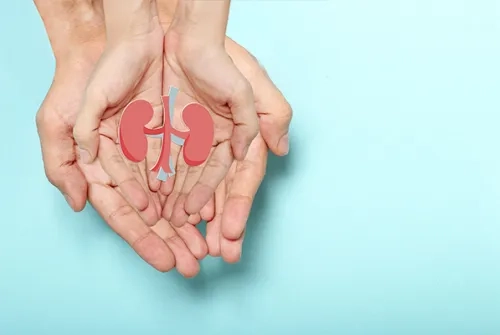Alo Yeditepe
Alo Yeditepe
Attention to the Genetic and Nutritional Factor: Five Out of Every 100 Children Have a Kidney Stone Problem
Pointing out that kidney stone problems are observed in five out of every 100 children, Pediatric Surgery Specialist Assoc. Dr. Şafak Karaçay stated that children and babies cannot express their complaints and emphasized that attention should be paid to genetic factors and nutritional patterns.
Despite being seen as an adult disease, kidney stone problem is among the issues that can also be encountered frequently in children. Stating that the formation of kidney stones in children for whom genetic factors are known to have a significant effect is of particular importance for our country, which is located in the kidney stone belt, Yeditepe University Kozyatağı Hospital Pediatric Surgery Specialist Assoc. Prof. Dr. Şafak Karaçay made important statements on the subject. Stating that this problem must not be limited only to kidneys, all stone formations in the overarching system, which is defined as the urinary system and includes the urinary tract, are included in this group, Assoc. Prof. Dr. Şafak Karaçay remarked, "Kidney stone in infants and children is a disorder we often encounter. We can detect it at rates as high as Five cases in every 100 children.”
”Attention Should Be Paid to the Color of Urine"
Reminding that children and babies cannot talk about the problems they have with their kidneys, they are not noticed from time to time or they are confused with different problems, Assoc. Prof. Dr. Karaçay said the following about the symptoms to be considered: “Kidney stones are suspected, especially during infancy, when the baby is restless, constipated or crying. As a result, although there may be hundreds of reasons that can manifest themselves with these symptoms in the baby, it should be considered that one of them is a kidney stone or a urinary system problem. Accordingly, necessary laboratory examinations should be conducted. In older children who can describe their pain, conditions such as pain, red or pink color changes in the urine, and the presence of blood cells in the urine, which we call hematuria, should be a warning. In this case, urinalysis and ultrasound will help in making the diagnosis.”
Applying Surgery to Stones That are Above 6 Millimeters
Assoc. Prof. Dr. Şafak Karaçay gave the following information about the treatment methods of kidney stones seen in children: “Surgical intervention is required in children whose stone size is above 5-6 millimeters. Because these stones are unlikely to pass spontaneously from the urinary tract. In recent years, there are more closed methods in children than in the past. With surgery, it is possible to enter the urinary tract with the endoscopic method, to break up the stones with a laser, or to reach the kidney by making a very small incision from the outside and break the stone with a laser and make it fall. For larger stones, it is also a preferred method to break these kidney stones by using solar sound waves, which we call ESWL, in suitable cases. ”
The Most Important Point is to Suspect
Assoc. Prof. Dr. Şafak Karaçay continued her words as follows: “In these children who arrive with delay, it is a little difficult to make an attempt due to congestion. In cases where this obstruction is not noticed over time, loss of function of the affected kidney may occur. In fact, patients may present with consequences such as kidney dysfunction and chronic kidney failure. The most important point for preventing these situations and early diagnosis is to suspect," said Assoc. Prof. Dr. Şafak Karaçay, and continued, “When in doubt, it is necessary to do the right tests, make the diagnosis and take the necessary steps for treatment as soon as possible.”
Genetic Factors Are Effective by 35 Percent in the Formation of Kidney Stones
Pointing out that genetic factors are one of the most important risk factors in the formation of urinary system stones in children, Yeditepe University Hospitals Pediatric Surgery Specialist Assoc. Prof. Dr. Şafak Karaçay continued his words as follows: “We know that genetic factors are effective around 30-35 percent. For this reason, especially children and babies with a history of stones in their parents should be screened. Of course, genetics is not the only cause. Now, environmental factors have started to come to a very important place. What we eat, drink, consume and feed our children are also effective factors in this problem. We see these problems much more frequently in children who consume a lot of fructose, consume drinks with high acid content, snacks such as junk food, high fiber-free fruit juices, have low daily water consumption and are sedentary. Therefore, it is necessary to suspect both genetics and pay attention to the way of nutrition.”
Press Coverage: cumhuriyet | turkuazgazetesi | gazetevatan | haber7 | haberler | cnnturk | sabah | takvim
About
Faculty and Year of Graduation:
Marmara University Faculty of Medicine (English), 1999
”
See Also
- Kidney Reflux Should Be Suspected in Children with Urinary Tract Infection
- Poop and Urine Incontinence in Children Can be a Sign of Serious Disorders
- Ingrown Hair Is Not Just an Adult Problem
- Hernias in Children Should Be Intervented Without Wasting Time
- Does Environmental Pollution Cause an Increase in the Cases of the Hypospadias?
Alo Yeditepe






